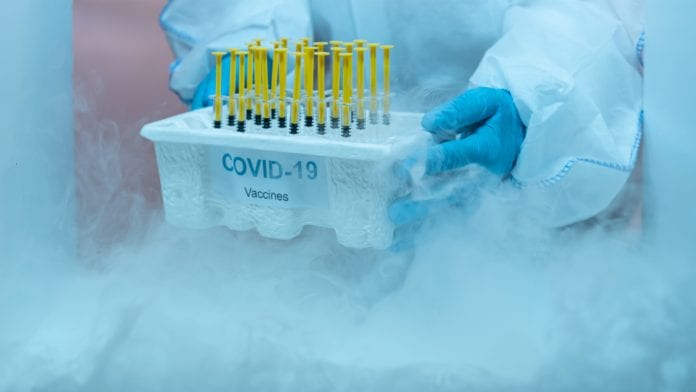
A team of scientists has developed a temperature sensor that can alert healthcare workers when a vial of vaccine reaches an unsafe temperature.
COVID-19 vaccines that have been developed are mRNA-based and require ultracold storage to remain effective, as mRNA is highly unstable. The team, including Sung Yeon Hwang, Dongyeop Oh, Jeyoung Park, and colleagues, wanted to develop a time-temperature indicator to help identify mRNA vaccines that reach unsafe temperatures during storage or transport so that they could be discarded.
The research has been published in ACS Omega, a journal of the American Chemical Society.
Safe vaccine storage
To help ensure the distribution of effective mRNA vaccines, the researchers have developed a tamper-proof temperature indicator that can raise the alarm when a vial of vaccine reaches an undesirable temperature for a certain period of time.
To make the time-temperature indicator, the researchers added a mixture of ethylene glycol (antifreeze), water, and blue dye to a small tube and froze it in liquid nitrogen. They then added a white cellulose absorbent to the top of the frozen coolant, turned the tube upside down, and adhered it to a larger glass vial containing simulated vaccine at -70 C.
At temperatures above -60 C, the antifreeze mixture melted, and the dye diffused into the white absorbent, turning it light blue.
The colour change happened around two minutes after the simulated vaccine was exposed to a higher temperature. Importantly, exposures of less than two minutes, which are unlikely to impair vaccine efficacy, did not turn the TTI blue.
The colour change persisted if the tube was refrozen at -70 C, which the researchers say makes the system tamper-proof. By changing the coolants or their mixing ratio, or by using different absorbents, the time-temperature indicator could also be tailored to monitor the ideal storage conditions of different mRNA vaccines, the researchers say.
The study was funded by the Korea Research Institute of Chemical Technology.
























